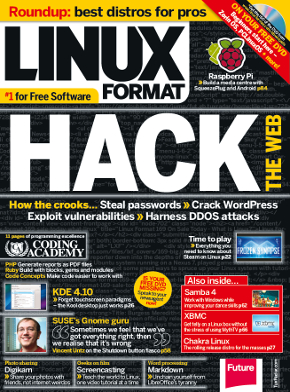
You are not safe
graham - March 28, 2013 @ 11:01am
Almost without our noticing, the web has become an integral part of our lives; it’s become the hub for shopping, banking, communicating, working and entertaining. Many of us carry devices that keep us connected all the time, and we think nothing of quickly grabbing our email, checking a forum or sending a message from wherever we might be. It’s in many ways more magical than the sci-fi future I was promised in the 1970s. But many of us are also in denial about two things. The first is that we think our presence on the internet is absorbed into the background noise of a billion other people going about their business, and that this makes us less of a target. And the second is that we know how prone our online habits make us, whether that’s because of rubbish passwords, or shared passwords, or an open access point, but we do nothing about it.
There’s a mathematical function somewhere with one line for a growing threat and another for decreasing security, and the only certainty is that at some point in the future, they will cross. This is why we’ve decided to revisit the world of online security, in an attempt to highlight some of the dangers of assuming the web is safe. Linux is the perfect platform for this kind of experimentation. The reason why the operating system is so secure, for example, is because any developer can look at the source code and work out what’s happening. The arcane and hidden data transfers that make up the World Wide Web should be no different. In this issue, we investigate some of the tools that can reveal this hidden world, as well as showing you how easy it can be for these tools to be turned against us. And just like with Linux, the solution to these weaknesses are increased transparency, awareness and education. It’s like debugging the internet!

Issue 170, May - on sale now
Hack the Web!
The internet is full of unpleasant people who would love nothing more than to steal your passwords, crack into your WordPress site and generally make a nuisance of themselves at your expense. So we learned their black arts so that you can protect yourself against them, and in the process we discovered that protection rackets have moved online through the power of DDOS attacks.
Also in the magazine we put a media centre onto a Raspberry Pi with Squeezebox (and control it with an Android phone), use the latest version of XBMC to do something similar, broadcast our excellent through screencasting, share photos with Digikam and salivate over the excellent games that we can play now that Steam has arrived on Linux.
On the DVD: Beginners start here - Zorin OS and PCLinuxOS, plus IPFire, SalentOS, SMS and Porteus.
All this and more, in your cracking/hacking latest Linux Format!



TuxRadar stories
Open Ballot: Would you pay for Linux?
Depending on how you pay for it, you'll probably have to part with at least fifty quid for...
Title: The Sultans Played Creole In this episode: We've got oodles of Google ne...
Open Ballot: Do Microsoft understand irony?
Microsoft (along with Nokia, Oracle and a host of other outdated tech companies) have lo...
Digital back issues of Linux Format half price until Tuesday!
Need some reading material this weekend? Our digital back issues are currently half price!...
Linux Format 170 On Sale Today - Hack the Web!
The internet is full of unpleasant people who would love nothing more than to steal ...
Title: SS Nostromo In this episode: Samsung laptops have been fixed. OpenShot lau...
Open Ballot: Your questions for Eben Upton/Raspberry Pi
As usual, we’re rushed off our feet and we don’t think we’ll have enough time to arr...
Title: Muphry's Law In this episode: OpenSUSE 12.3 is out, Red Hat takes owners...
Open Ballot: What does education need?
Rapper William James Adams* has spoken out about IT education in the UK here: http://www.b...
For one week only, Linux Format is available on Google Play in the UK for just 99p! (https...
Don't miss the TuxRadar Podcast from Team LXF, and follow us on Identi.ca and Twitter!

Web hosting by UKFast

 Copyright 2006 - 2011 Future Publishing Limited
Copyright 2006 - 2011 Future Publishing Limited